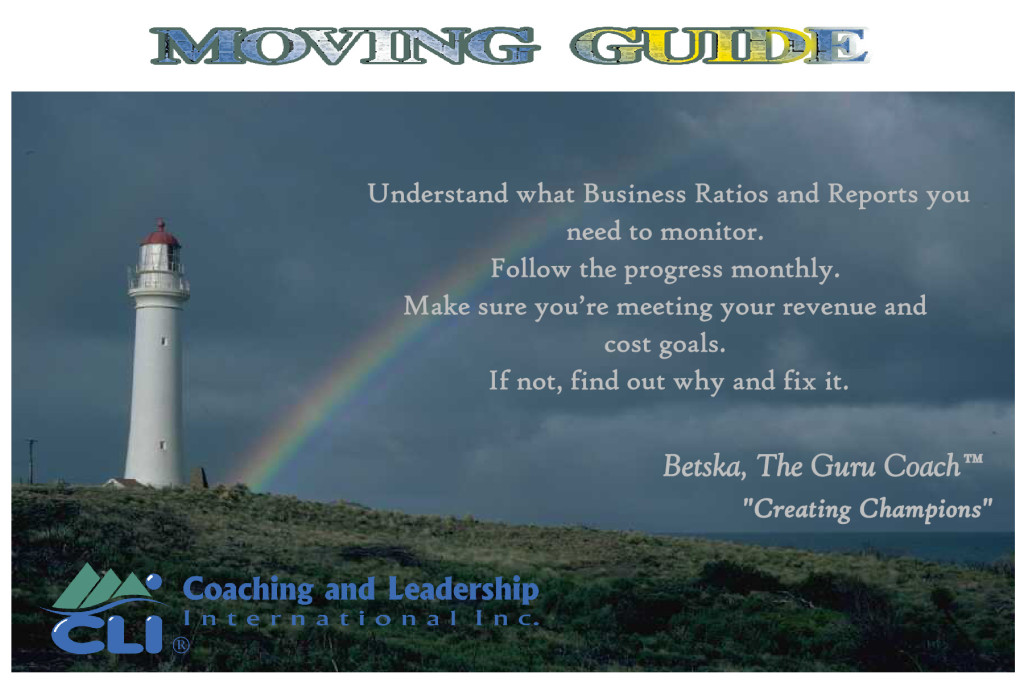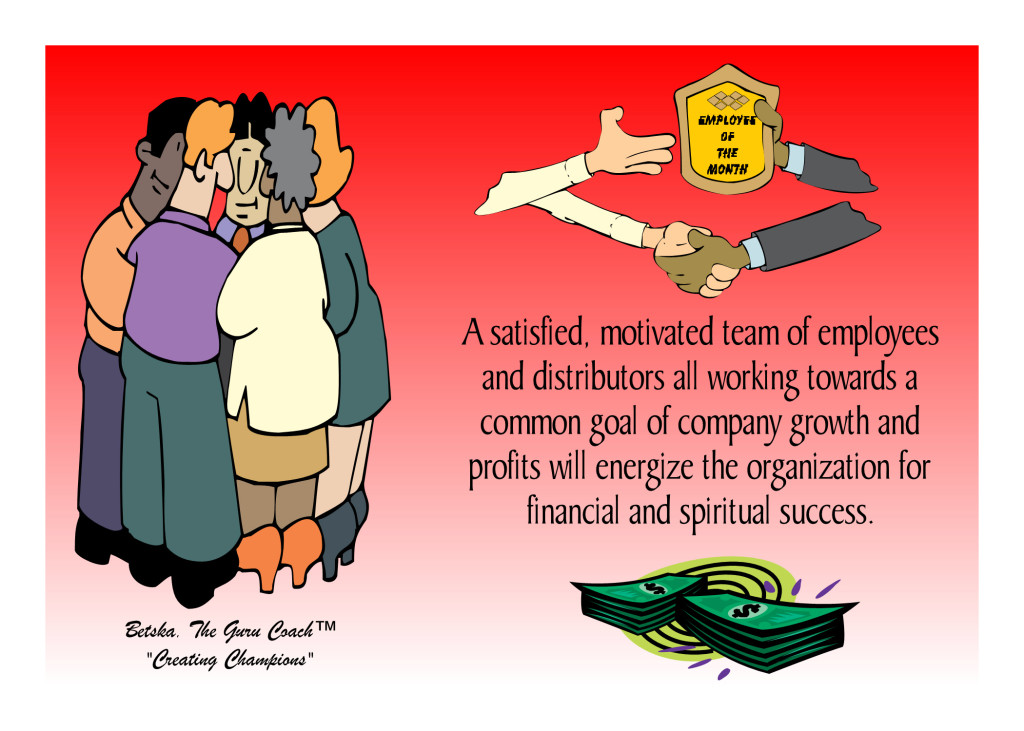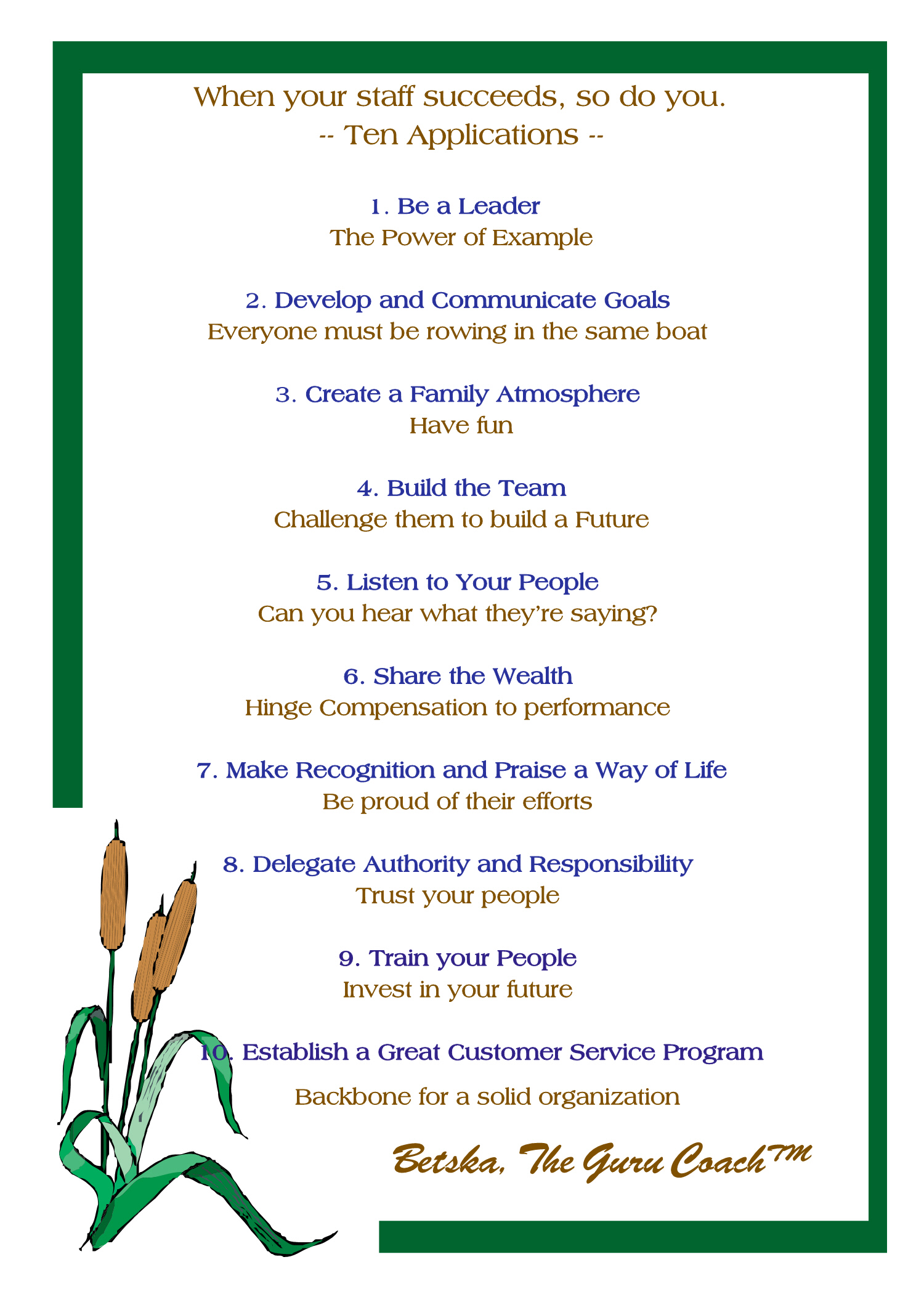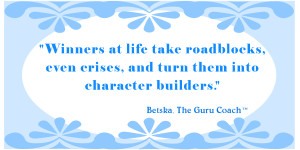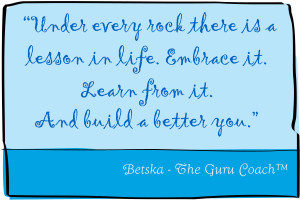Tag Archives: Success
Are you Accepting Good Enough?
Are you a Leader who accepts Good Enough?

If you are accepting status quo as good enough then you can bet that you are leading your team to nowhere. Challenging the current state of affairs and questioning the way “it is normally done here” attitude is the only sure way to improvement and remain competitive.
Whether you wish to improve your professional leadership at work or your personal leadership with your family, we invite you to use CLI’s phenomenal scientific brain game called “The Brain Walk®“ to identify immediate solutions to challenges that are hiding in your subconscious mind. We call these blind-spots. Got any of those? We all do!
True leaders at any rank within the organization, love themselves and their organization so much that they are committed to going inside self and finding the courage and the ability to suggest and implement change. They simply do not accept Good Enough in the workplace. Even if something is working, it can always be improved.
Betska, The Guru Coach™
Sign up for CLI QuickTip™ and Blog Updates at:
Coaching and Leadership International Inc.
Part II. Creating Champions – Inspiring Excellence in the Workplace
Be a Leader – The Power of Example
(Tweet this)
This blog article is a continuation of my last blog on the many hats of a Leader.
 7) Trainer
7) Trainer
A Leader is a trainer. Give all of your people the opportunity to learn. Some will need encouragement; others will take anything they can get.
8) Facilitator
A leader is a facilitator. You make things happen and keep everyone on track. You make the goals appear simple by guiding your people to achieve their goals.
9) Problem Solver
A Leader is a problem solver. It is your role to ensure that your people feel comfortable enough to approach you about a problem. Build a feeling of trust between you and each employee. You will be rewarded with a loyal and content staff.
10) Planner
A Leader is a planner – a strategic one. You must plan to shape the future of the organization. John Naisbitt writes, “The most reliable way to anticipate the future is by understanding the present.”
11) Coach
A Leader is a Coach! A Coach listens exceptionally well and asks a lot of questions. You invite your people to come up with their own answers. Leaders who attend CLI’s PCMK™ Coach Training programs learn very early on The Law of Belief, “What we think, we become.” 95-99% of our behaviours are governed by our subconscious mind. Therefore, every person in an organization should be vigilant about checking out their subconscious beliefs and turfing out their negative ones.
12) Guardian of the Bottom Line
Someone once said that hard work is the yeast that raises the dough. No doubt about it: it takes hard work and good leadership to bring in the sheaves of wheat. And, it takes even more work to keep costs down. There is no magic to guarding the bottom line:
- Understand what Business Ratios and Reports you need to monitor.
- Follow the progress monthly.
- Make sure you’re meeting your revenue and cost goals.
- If not, find out why and fix it.
13) Innovator – this is a Bonus Hat!
A Leader is an innovator. There are six vision skills we must embrace if we are to successfully move into the 21st century. Picture a vehicle called the Vehicle for Progress where the front wheel skills are leadership, teamwork and aligned empowerment. The back wheel skills are risk, innovation and change management. While the front-wheel skills steer the organization, the back-wheel skills propel the organization forward. By taking risks and being innovating only then can we progress.
Wow! So many hats a Leader must wear. Which hat are you wearing today? Which ones could you wear tomorrow? Which ones do your people need you to wear in order to create a more successful future?
Betska, The Guru Coach™
Creating Champions
Sign up for CLI QuickTips™ and Blog Updates at:
Coaching and Leadership International Inc.
Application #1 to Creating Champions – Inspiring Excellence in the Workplace
Be a Leader – The Power of Example
This is the first application for Creating Champions, part of a series of blog articles with the overall theme of “When your staff succeeds, so do you.”
I’ve searched the learned halls of the internet and the depths of my brain for a good, short definition of leadership. I came to one conclusion. It’s impossible to define leadership in any short, concise way. It’s too complex. The closest I have come is:
Managers shuffle paper, Leaders inspire people.
The term “Leader” applies to anyone who manages people, directly or indirectly. A Leader knows that by creating champions of people, he/she will also succeed. They don’t have to be good at everything, but good leaders know that by setting an example, by exhibiting excellent people skills, chances are their organization will run more smoothly. Leaders inspire their employees to become champions at their jobs.
A Leader is 13 people in one. No wonder it’s a tough job! Let me briefly explain the first 6 of the 13 roles.
1) An Administrator
A Leader has to be good at shuffling paper, each page no more than twice. Not once. Not three times. Twice. Once to read and once to follow-up, if required. You spend as little time as possible shuffling paper because you are needed to help make decisions in meetings. The same applies to each email, handle each email a maximum of two times.
2) A Marketer
A Leader needs to know the business – He or she has to understand the market place, the competition, the customers and the product. Knowing how to make the customer buy is all-important. Be creative. Be service-oriented. Remember to differentiate.
3) A Manager
A Leader is a manager of people and time — a mover and a shaker! Invest in a good time-management system that should contain the following:
– Daily record of appointments and projects.
– Month at a glance.
– Year at a glance.
– A page for recurring tasks and events.
– A section to list what needs to be done.
– A follow-up process.
– A database where the coordinates of prospects are easily accessible.
– A section for expenses.
With advanced software, our role as a ‘Manager’ is much easier.
4) A Salesperson
A Leader needs to be a sales person. For example, the 10 applications to Creating Champions must be sold to the managers of your organization. After all, they are the ones who will sell it to their people and make it work.
5) A Motivator
A Leader is a motivator. Attitudes from above affect the entire organization. It gets a little tough when you hit the l000th employee but I’ve seen people do it! John Myser, former President of 3M Canada Inc., had an enormous capacity for remembering names. During his reign, 3M Canada had over 2,000 employees. Yet, you could hear him calling people by name as he walked the halls of the corporate head office. Treat your people well, care for them and they will reward you with success.
6) A Builder
A Leader is a builder. With the strength of a motivated staff, you will build the organization that you want. Expose your employees to a myriad of different ideas and philosophies by taking their minds outside of the workplace and they will repay you by being more creative on the inside.
For example, Mr. Myser implemented “lunch meets” to which employees would bring their lunch and listen to a topic for an hour. At some of those lunch meets, he would talk about performance and how no one should be afraid to fail.
“Failure is Success if we learn from it.” – Malcolm S. Forbes
(Tweet this)
He brought in a brain surgeon one day to speak about his job. That was incredibly fascinating! On another occasion he invited us to have lunch while listening to a classical orchestra.
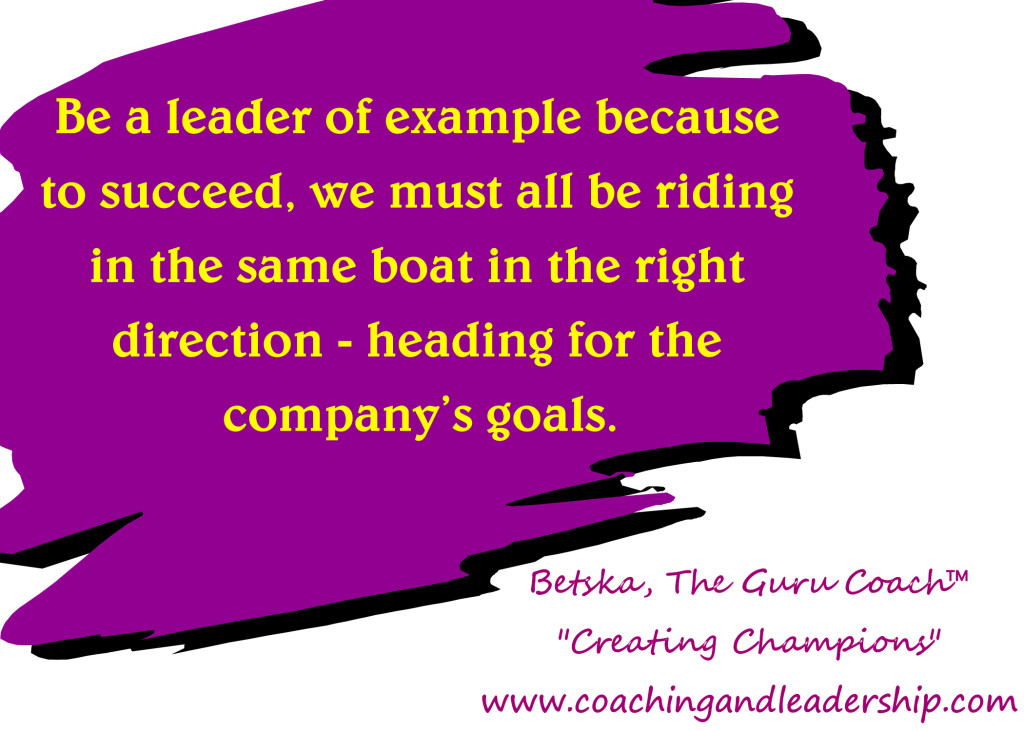
Next article, we’ll explore the remaining 6 roles of a Leader and an important chart on The Many Facets of a Leader including interpersonal skills and major assets.
Betska, The Guru Coach™
Creating Champions
Sign up for CLI QuickTips™ and Blog Updates at:
Coaching and Leadership International Inc.
Creating Champions – Passport to the 21st century
Over the next several blog articles we’ll be featuring the details of these ten absolutely critical applications a Leader must do to support the growth of their direct reports and all those in the organization.
All the best product and services in the world are not going to get you anywhere without a motivated team of champions driving your goals to growth and profitability. Creating these champions requires focused attention. It requires extraordinary people skills. It may mean changing your corporate culture, your organization structure and the way you do business with your customer.
Incentive programs can assist an organization in temporarily boosting morale. Use incentive programs to reward solid solutions, instead of quick fixes. To have an enduring effect, treat your employees well on a daily basis by running your organization with feeling, with heart.
![]() “Expect the best from your people. Communicate your expectations. Consciously work at identifying and acknowledging good behaviour. Lead your people to be successful and they, in turn, will make you successful. Recognize their achievements and praise them for their efforts.”
“Expect the best from your people. Communicate your expectations. Consciously work at identifying and acknowledging good behaviour. Lead your people to be successful and they, in turn, will make you successful. Recognize their achievements and praise them for their efforts.”
‘Creating Champions’, is a book that is inspiring excellence in the workplace. The concepts in Creating Champions, when implemented, help organizations overcome communication roadblocks. By encouraging employees and management to communicate openly, challenges can be overcome and opportunities seized.
We welcome you to stand by and read the next several blog articles featuring each of the Ten Applications to Creating Champions.
When your staff succeeds, so do you.
(Tweet this)
Betska, The Guru Coach™
Creating Champions
Sign up for CLI QuickTips™ and Blog Updates at:
Coaching and Leadership International Inc.
The Road to Success is Always Under Construction!
Children dream BIGGG dreams. Nothing clouds their vision. And nothing seems impossible. Adults, on the other hand, often limit their potential by dismissing their dreams before they ever get off the ground; a habit picked up from parents/teachers/friends and so on, as well as from experiencing failure. Most people have forgotten how truly great they are. If we believe that we are all “God” inside, or put another way, that we are all geniuses (full of potential), then we can achieve whatever we want to achieve. Make sense?
Before we can set realistic and exciting goals, let’s shut down the internal editor and dream BIGGG.
Via The Law of Attraction, we attract obstacles into our lives to learn from them. However, if we are attracting too many obstacles, our belief system in the subconscious mind might be that we love chaos! Some folks thrive on drama because without it, their lives might get boring. As an Executive and Life Coach, I see this happening around me all the time. Interesting, isn’t it?
Well, when it comes to roadblocks my message is this:
My own life has been filled with roadblocks, many with spikes in the road! But I’ve kept my enthusiasm with one simple philosophy:
The road to success is always under construction!
Lessons in life under these rocks:
1. If something negative from your childhood is weighing your life down, get rid of it. For help, you can turn to support groups, personal counseling or powerful and fast modalities such as CLI’s Power Coaching® with Mind-Kinetics®.
2. Learn to forgive. When we hold a grudge, we are in conflict. We know no inner peace. Let it go. Lowering our expectations of others makes it more difficult to be hurt.
3. As parents, we need to be aware of the many needs of a child so that we don’t create lifelong scars. History has proven that children take on our patterns/beliefs, good or bad. A great gift hubby John and I have given our daughter is the gift of addressing our own negative thoughts and getting rid of them. She then has less of a chance of taking on our negative patterns.
4. We can’t afford to let the values or insecurities of our parents or spouses hold us back from achieving our dreams.
5. Education is a precious asset. There are many kinds of education and many ways to acquire it. We can also become serious students of life. For example, learning The Universal Laws of Human Behaviour is a paramount. Bruce McArthur teaches us these laws in his book, “Your Life”.
6. If we find ourselves in a situation of conflict, it’s essential that we resolve it quickly. Conflicts create unhealthy stress which diminishes our ability to perform at our best.
7. We need an equal balance between work and home life to stay healthy. All work and no play can create havoc in our lives. Our personal life should be priority number one. After all, it’s much easier to replace a job than it is to replace a loving family and good friends.
Betska, The Guru Coach™
Flying by the Seat of Your… Plans
Sign up for CLI QuickTips™ and Blog Updates on:
Coaching and Leadership International Inc.












